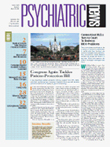Families of children with physical and mental disabilities who no longer qualify for Medicaid may get a financial break under legislation reintroduced in Congress last month.
Known as the Family Opportunity Act, the bill allows families with incomes above the state-prescribed Medicaid limit to buy at affordable rates the same services they had access to when they were Medicaid eligible. This buy-in option could improve the lives of numerous children with severe and pervasive disorders who rely on Medicaid’s early screening, detection, and treatment services.
APA applauded Rep. Henry Waxman (D-Calif.) and Rep. Pete Sessions (R-Tex.) for introducing HR 600 last month in the House and Charles Grassley (R-Iowa) and Edward Kennedy (D-Mass.) for reintroducing the companion bill (S 321) in the Senate.
Despite strong bipartisan support, the 2000 Family Opportunity Act stalled in Congress late last year (Psychiatric News, September 1, 2000). The price tag for the legislation is approximately $7 million annually for Fiscal 2002 through 2007.
APA President Daniel Borenstein, M.D., praised the efforts of the lawmakers in a letter to them in February. “The measure is an important policy improvement for families with children and adolescents suffering from mental illness,” he wrote.
An estimated 220,000 children with severe and pervasive mental disorders are enrolled in the Supplemental Security Income (SSI) program at any given time. Typically, low-income families whose children meet SSI disability criteria also apply for Medicaid to cover their child’s psychiatric and other health care visits, according to Lizbet Boroughs, an associate director in the APA Division of Government Relations.
The problem is that families can be bumped off the Medicaid rolls once their income rises above the prescribed eligibility ceiling set by the states.
“This creates an enormous, virtually insurmountable disincentive for parents with chronically ill children to improve the family’s financial position,” emphasized Borenstein.
However, under the Family Opportunity Act, families whose children still qualify for SSI would be able to buy Medicaid services at discounted rates according to their income level. Maximum out-of-pocket limits also would be based on income, according to the bill.
For example, families with incomes at or below 300 percent of the poverty level would pay a maximum premium of 5 percent of their income, and families with incomes between above 300 percent but below 600 percent of the poverty level would pay a maximum premium of 7.5 percent of their income, according to a General Accounting Office (GAO) report issued last year.
The federal government has determined that the 2001 poverty level for a family of four is a maximum annual income of $17,650, according to Boroughs. States determine the income eligibility based on a percentage of the federal level. For example, the poverty level for a family of four in New York is $11,004, compared with $21,180 in Alabama.
The bill would also allow states to use in-home and community-based programs for Medicaid-eligible children receiving psychiatric services in hospitals and establish a demonstration program to extend Medicaid to children with a disability that is not severe enough to qualify them for SSI. The goal is to determine whether Medicaid services can prevent disabilities from worsening and keep children off SSI rolls, the GAO pointed out.
Finally, the bill calls for establishing and funding health information centers to inform families about health care programs and services for disabled children.
The summaries and full text of the two bills are available on the legislative Web site thomas.loc.gov by entering the bill number (HR 600 or S 321) or its name, the Family Opportunity Act. ▪
